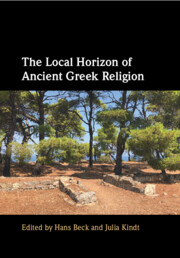Book contents
- The Local Horizon of Ancient Greek Religion
- The Local Horizon of Ancient Greek Religion
- Copyright page
- Contents
- Figures
- Contributors
- Preface
- Abbreviations
- 1 Localism and the Study of Ancient Greek Religion: The Example of the Divine Persona
- 2 Refitting the Local Horizon of Ancient Greek Religion (Including Some Remarks on the Sanctuary of Poseidon on Kalaureia)
- 3 Mycenaean Greek Worship in Minoan Territory
- 4 Hera on Samos: Between the Global and the Local
- 5 Polytheism and the Distribution of Votives in the Corinthia
- 6 Demeter Chthonia at Hermione: Landscapes and Cult
- 7 Local Variation in the Thesmophoria Festival: A Case Study of the Attic and Sicilian Thesmophoria Festivals
- 8 The Lindian Chronicle and Local Identity
- 9 Shifting Identities and Defensive Localism: Conflicts of Religious Narratives in Post-Synoikism Rhodes
- 10 Between Local and Global? Religion in Late-Hellenistic Delos
- 11 Personal or Communal? Social Horizons of Local Greek Religion
- 12 How to Write a Local History of Imperial Greek Cults: Observations from Pausanias
- 13 Panhellenic Sanctuaries: Local and Regional Perspectives
- Epilogue: A Tribute to Potnia of the Labyrinth
- Index
- References
11 - Personal or Communal? Social Horizons of Local Greek Religion
Published online by Cambridge University Press: 06 April 2023
- The Local Horizon of Ancient Greek Religion
- The Local Horizon of Ancient Greek Religion
- Copyright page
- Contents
- Figures
- Contributors
- Preface
- Abbreviations
- 1 Localism and the Study of Ancient Greek Religion: The Example of the Divine Persona
- 2 Refitting the Local Horizon of Ancient Greek Religion (Including Some Remarks on the Sanctuary of Poseidon on Kalaureia)
- 3 Mycenaean Greek Worship in Minoan Territory
- 4 Hera on Samos: Between the Global and the Local
- 5 Polytheism and the Distribution of Votives in the Corinthia
- 6 Demeter Chthonia at Hermione: Landscapes and Cult
- 7 Local Variation in the Thesmophoria Festival: A Case Study of the Attic and Sicilian Thesmophoria Festivals
- 8 The Lindian Chronicle and Local Identity
- 9 Shifting Identities and Defensive Localism: Conflicts of Religious Narratives in Post-Synoikism Rhodes
- 10 Between Local and Global? Religion in Late-Hellenistic Delos
- 11 Personal or Communal? Social Horizons of Local Greek Religion
- 12 How to Write a Local History of Imperial Greek Cults: Observations from Pausanias
- 13 Panhellenic Sanctuaries: Local and Regional Perspectives
- Epilogue: A Tribute to Potnia of the Labyrinth
- Index
- References
Summary
This chapter turns to the social matrix of the local. Beyond spatial connotations, local communities are aggregations of people first and foremost who cultivate a particular identity of place. Since Greek communities typically included people from other locations, the social texture of the local was subject to varying degrees of cultural diversity. In the field of religion, corresponding negotiations between individual and communal practices were complicated by charged perceptions of what constituted the social core of the local, that is, who was part of it – and who was not. The chapter sets out to disentangle the threads of personal and communal agency. Polinskaya begins her discussion with examples that attest to cultic initiatives undertaken by individual citizens and foreign residents. Beyond well-known practices of turning private endeavours into communal ones (for instance by decree of the polis), Polinskaya unravels more hidden, non-linear processes of communal opting in and staying in. She traces the ways in which personal agency gradually inspired and received communal resonance and meaning.
- Type
- Chapter
- Information
- The Local Horizon of Ancient Greek Religion , pp. 312 - 341Publisher: Cambridge University PressPrint publication year: 2023

